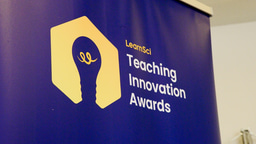Leadership for underrepresented trainees: the LeaP program

What does it mean to graduate with a PhD in the biomedical sciences? What skills should one have upon graduation? What should we do as scientists and educators to best prepare graduates for success in their future careers? Two observations became clear as we grappled with and reflected on these questions. First was that while most biomedical PhD graduate programs offer professional development programming, few provide guidance and support around applying those skills in real life settings. Fewer proactively seek to develop leaders. Our second observation was that individuals from underrepresented (UR) backgrounds face steeper challenges than their majority counterparts when it comes to navigating graduate school. These challenges and obstacles have contributed to a lack of representation among biomedical leaders – both in academia and in the private sector – an issue that is not often addressed until later career stages, often in the form of reactive policies or “on-the-job” type training. We saw an opportunity to tackle both leadership/professional development deficits and underrepresentation in biomedical leadership by creating LeaP (Leadership in PhD), a longitudinal, cohort-based program designed to prepare UR biomedical research trainees for future leadership opportunities in academia, industry, and community arenas. (1)
With LeaP we sought to break the mold of how professional development is traditionally approached in academic science. Many, if not most, leadership programs are delivered in a short, intense format – either in intensive workshop-based settings, or intermittently over a limited time frame (typically less than one year). As opposed to being another “one-and-done” CV line item, we created LeaP with the intention of providing participants with an opportunity to embark on a professional development journey in parallel (and hopefully intertwined) with their scientific training. We aimed to equip trainees, over 4 years, with perduring leadership skills through a blend of didactic instruction, self-reflection, goal-setting, and experiential learning. Shown in Figure 1 is a high-level overview of the activities we aimed to include in each program year: Year 1 would feature monthly didactic sessions focusing on foundational leadership concepts, followed by facilitated peer discussions and one-on-one coaching sessions. Year 2 moves toward student-centered didactic learning along with initial leadership opportunities such as meeting planning, discussion facilitation, and peer mentoring. In Years 3 & 4, students continue to practice leadership skills through participation in intramural and extramural experiential opportunities.

We grounded and supported the development of LeaP upon two foundational pillars: cohorts and coaching. The cohort-based model was coupled with intentional facilitation aiming to foster a supportive, non-judgmental, and encouraging learning environment. With one-on-one coaching we aimed to encourage student-centered, and progressively self-directed, learning and growth. According to Losch and colleagues, “coaching can be defined as a collaborative helping relationship, where coach and client (‘coachee’) engage in a systematic process of setting goals and developing solutions with the aim of facilitating goal attainment, self-directed learning, and personal growth of the coachee”. (2) LeaP coaching sessions included time for self-reflection, strength identification, motivation exploration, and goal setting to support real-world leadership skill implementation/practice.
Multifactorial success
The outcomes from the first year of LeaP exceeded our expectations, with highly positive results from unit surveys (five) and a final, year-end focus group. Some notable feedback that came through in the evaluations included (paraphrased):
- LeaP provided a space to be vulnerable, to build relationships, to belong, and to learn in a judgment-free zone;
- Group facilitators were consistently prepared with thoughtfully curated discussion prompts, had good rapport, created a supportive and judgement-free space, and acted as discussion moderators as needed;
- Coaching provided a tailored experience that led to individual growth;
- Session topics were important and the program framework/schedule had built in time to reflect and follow up through group discussion.
Additional impacts identified by LeaP scholars included: building communication and self-advocacy skills, clarifying goals (professional and personal), and developing self-efficacy as leaders.
We attribute the positive evaluation results to several factors including: group facilitation, cohort size, relationship building, coaching, and the role of the non-scientist educator. Specific aspects of each of these factors stand out:
- Good facilitator dynamics (complementary personalities, mutual trust, supportive of each other, actively listen to and care about each other and all group members);
- Facilitator “way of being” (authentic, vulnerable, foundation of care and compassion, see all group members as equals – despite difference in roles/status – everyone was valued and mattered equally);
- Cohort size and relationship building (eight student cohort allowed for wide participation, openness, vulnerability, and connection among group members);
- Non-scientist educator in a co-director role (program co-creator, coordinator, co-facilitator, and coach with experience in curriculum design, teaching, and coaching and adequate time dedicated to building, maintaining, evaluating, growing, and continually improving a high-quality program).
The long view
While these early returns are encouraging, major considerations for sustainability and replicability remain. The first year of LeaP was made possible largely through a generous one-time award from the Kern National Network for Caring and Compassion in Medicine (KNN) to cover coaching effort and in support of a shared and blended leadership approach that featured a non-scientist educator and a faculty researcher. This model, as opposed to the more common faculty-driven program director model, provided an opportunity for individuals with different backgrounds and unique skill sets (educator and scientist) to come together collaboratively and creatively to develop a novel program. This approach does however require committed funding and institutional recognition of the value of alternative educational models. When considering replicability, we believe the following three aspects of the LeaP model are critical: intentional facilitation, quality coaching, and time. First, intentionality around facilitator selection is key. Further, systems need to be in place to train and support facilitators to establish consistent and high-quality facilitator/participant experiences. We believe that a care and compassion-based facilitator “way of being” is needed to foster supportive spaces for participants and facilitators where trust can be built, participants can be vulnerable, and learning can take place collaboratively in a safe and encouraging environment (see the KNN Framework for Flourishing (3)). Second, coaching from a trained neutral party provides a structure and environment that promotes individual goal setting, growth, and self-efficacy. Third, and perhaps most important for long-term stability, is that adequate time needs to be allotted to program directors for continuous planning, for maintaining synergy between program components and flexibility to cohort-specific needs, to gather and respond to feedback, and to engage with partner program evaluators for assessment, evaluation, and continual improvement. Ultimately, we hope that biomedical institutions across the globe recognize LeaP as an operational model of leadership development for UR trainees that can be adapted to institutional, regional, and population-based needs.
References:
- Doles, M. D., Kang, J. Y., Scholl, L. M. & Doles, J. D. Leadership in PhD (LeaP): A longitudinal leadership skill building program for underrepresented biomedical research trainees. Frontiers in Education 8 (2023).
- Losch, S., Traut-Mattausch, E., Mühlberger, M. D. & Jonas, E. Comparing the Effectiveness of Individual Coaching, Self-Coaching, and Group Training: How Leadership Makes the Difference. Frontiers in Psychology 7 (2016).
- KNN Framework for Flourishing.
Photo by LinkedIn Sales Solutions on Unsplash





Join the FEBS Network today
Joining the FEBS Network’s molecular life sciences community enables you to access special content on the site, present your profile, 'follow' contributors, 'comment' on and 'like' content, post your own content, and set up a tailored email digest for updates.